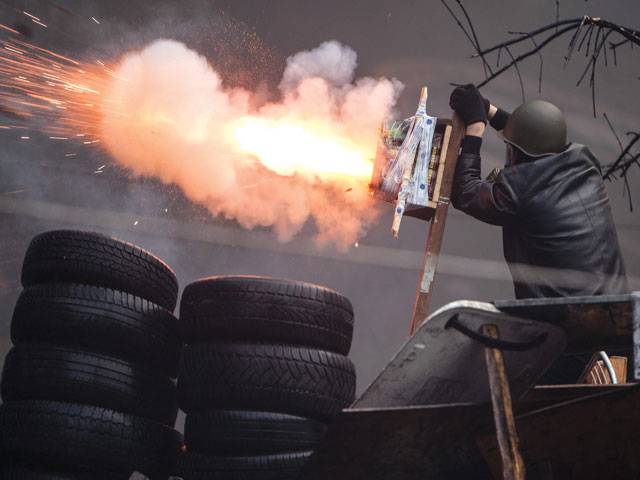KIEV - Riot police fired live rounds at protesters in an explosion of violence in Kiev on Thursday that left more than 60 people dead as the European Union imposed sanctions on those with “blood on their hands”.
Bullet-riddled bodies were scattered amid smouldering debris after masked protesters hurling Molotov cocktails forced gun-toting police from the capital’s Independence Square — the epicentre of the increasingly bloody revolt against President Viktor Yanukovych’s pro-Russian rule.
Opposition medics said more than 60 protesters had been shot dead by police on Thursday alone. Kiev authorities for their part put the total toll from three days of violence at 67.
Both sides accused each other of using snipers in a major escalation of the crisis sparked by Yanukovych’s rejection in November of an EU pact in favour of closer ties with Moscow.
Three European Union foreign ministers held talks with the president and opposition leaders in Kiev to discuss a way out of the turmoil.
The White House meanwhile said it was “outraged by the images of Ukrainian security forces firing automatic weapons on their own people”.
In a makeshift morgue in a hotel overlooking the square, where seven bodies were lined up, volunteer medics accused police of killing demonstrators with live rounds.
“They were shot in the head or in the heart by live bullets, not by rubber ones,” said first aid worker Natalia.
Faced with international outrage, Ukraine’s interior ministry said it reserved the right to use live munition “in self-defence”, but would not comment on opposition claims that its snipers were picking out protesters from the crowd.
The ministry also accused “extremists” of seizing 67 of its troops at gunpoint and holding them hostage in one of buildings near the war-scarred square.
The shocking scale of bloodshed in a strategic nation that serves as a brittle diplomatic bridge between Russia and the West prompted EU officials to follow their US counterparts and slap travel bans against Ukrainians responsible for ordering the use of force.
Italian Foreign Minister Emma Bonino said an agreement was also reached at an emergency EU meeting in Brussels to impose asset freezes on those with “blood on their hands”.
The measures mark a U-turn for Brussels, which had so far resisted opposition demands for sanctions.
The United States has already put 20 top Ukrainian officials on a visa blacklist.
“Helping to stop the violence is the immediate priority,” British Foreign Secretary William Hague said in Brussels.
Ukraine’s former master Russia blasted the sanctions as “bullying” and said President Vladimir Putin was sending a representative to Kiev to act as a mediator in talks with the opposition.
The EU meanwhile pressed on with a diplomatic push to find a way out of the crisis, with one Western source saying they were encouraging Yanukovych to agree to a peace plan that would see the opposition enter the government with new powers.
The foreign ministers of France, Germany and Poland met with Yanukovych for about five hours to discuss a possible “roadmap” to end the violence and start real negotiations, according to a German delegation source. Polish Foreign Minister Radoslaw Sikorski said on Twitter that talks were also being held with three top opposition leaders “so as to test proposed agreement.”
While Ukraine’s crisis was ignited by Yanukovych’s shock decision to turn away from the EU and instead accept a $15 billion bailout from Moscow, it has evolved into a broader anti-government movement.
Kiev has been the focal point of the protests, but the unrest has also swept through the pro-Western west of the country and parts of its more Russified east, exposing the deep historical fault lines between the two.
Yanukovych had appeared determined Wednesday to end the crisis by force after the security services announced plans to launch a sweeping “anti-terror” operation.
He also sacked the army’s top general — a powerful figure lauded by the opposition for refusing to back the use of force against those who had descended to the street.
The president was dealt a further embarrassing blow when Kiev mayor Volodymyr Makeyenko resigned Thursday from the ruling party in protest at the “tragedy” of the unrest.
Ukraine’s police force also appeared to admit an inability to control the scale of the latest carnage as it bluntly advised Kiev residents “to simply stay indoors”.
“These security measures are necessary because the streets of Kiev are occupied by armed and aggressive people,” Ukraine’s interior ministry said in a statement.
Friday, April 19, 2024
Dozens dead in Ukraine as EU adopts sanctions

Caption: Dozens dead in Ukraine as EU adopts sanctions
US vetoes Palestine’s bid for full UN membership
8:27 AM | April 19, 2024
20pc Discos employees involved in power theft: Minister
April 19, 2024
Five govt officials shot dead in D I Khan
April 19, 2024
Parvez Elahi’s indictment delayed again in two cases
April 19, 2024
Hepatitis Challenge
April 18, 2024
IMF Predictions
April 18, 2024
Wheat War
April 18, 2024
Rail Revival
April 17, 2024
Addressing Climate Change
April 17, 2024
Justice denied
April 18, 2024
AI dilemmas unveiled
April 18, 2024
Tax tangle
April 18, 2024
Workforce inequality
April 17, 2024
New partnerships
April 17, 2024
ePaper - Nawaiwaqt
Advertisement
Nawaiwaqt Group | Copyright © 2024





